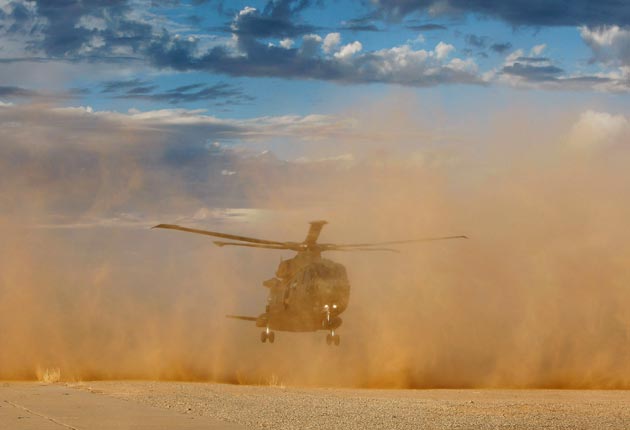Brown to push for 5,000 extra troops in Afghanistan

Your support helps us to tell the story
From reproductive rights to climate change to Big Tech, The Independent is on the ground when the story is developing. Whether it's investigating the financials of Elon Musk's pro-Trump PAC or producing our latest documentary, 'The A Word', which shines a light on the American women fighting for reproductive rights, we know how important it is to parse out the facts from the messaging.
At such a critical moment in US history, we need reporters on the ground. Your donation allows us to keep sending journalists to speak to both sides of the story.
The Independent is trusted by Americans across the entire political spectrum. And unlike many other quality news outlets, we choose not to lock Americans out of our reporting and analysis with paywalls. We believe quality journalism should be available to everyone, paid for by those who can afford it.
Your support makes all the difference.Prime Minister Gordon Brown said today he believed he could secure a commitment of 5,000 extra troops for the military operation in Afghanistan from Nato and other allies.
Britain has pledged to provide a 500-strong reinforcement to help train up Afghan security forces if partner nations will share the burden.
The Prime Minister is now lobbying some of the 43 nations involved in the International Security Assistance Force to make their own contribution to a fresh push.
"I have taken the responsibility of asking others in Europe, and outside Europe actually, if they will back this strategy which is partnering the Afghan forces, mentoring the Afghan forces," he told BBC Radio 4's Today.
"We need our other Nato allies to help. I am asking them to help. I think we can probably get another 5,000 forces into Afghanistan from that Nato and outside Nato group and Britain will be part of that."
He spoke out as allies continued to await a final decision by US President Barack Obama over whether to send hundreds of thousands of additional US troops.
Mr Brown said his conversations with the White House had left him assured the UK strategy was "very much in line with what President Obama wants to achieve".
Mr Brown said: "There has got to be burden sharing amongst the alliance and I am sending people around Europe to persuade other countries that they should commit more troops.
"We are having some success. But as the debate over these last few months has shown, there is a lot more that we have to do," he said.
"We are the only country actually to have said that we will provide more troops as things stand, but I believe that others will, including countries from Nato.
"Our strategy must be Afghan control of their own affairs. That will take some time, but then British troops can start coming home."
President Obama is still grappling with his response to a plan drawn up by General Stanley McChrystal - commander of international forces in Afghanistan - for tens of thousands more troops.
Asked if he was frustrated by the delay, Mr Brown said: "I have talked to President Obama...and I am satisfied that the strategy I outlined several weeks ago...is very much in line with what President Obama wants to achieve.
"In every country, in this country, there is a legitimate debate about strategy and about tactics but I am pretty sure that what President Obama wants to do is very much in line with the counter-insurgency proposals of General McChrystal.
"And I am absolutely sure also that he wants us to work with him in coalition partnership."
The premier was speaking after a leaked memo showed UK officials proposed a strategic reconciliation between the Afghan government and Taliban leaders.
The document, seen by the BBC, proposed removing "reconciled Talibs" from the UN sanctions list. It said the "right combination of carrot and stick, at the right moment, would be critical to changing the calculations of individual commanders and their men".
But Mr Brown said the key was to strengthen Afghan institutions so they could take control.
"If at that point Afghans who are associated with the Taliban, who are not ideologically extremist as many are, are prepared to renounce violence, are prepared to join the political process, are therefore prepared to divide the Taliban by leaving any association with the insurgency, that is re-integration, that is reconciliation," he said.
"It happens in most conflicts. But it is not our strategy."
Join our commenting forum
Join thought-provoking conversations, follow other Independent readers and see their replies
Comments